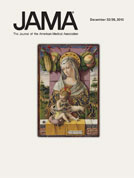 Anil Potti, the former cancer researcher whose work has become the subject of intense scrutiny that has already led to the retraction of five papers, didn’t tell the Journal of the American Medical Association (JAMA) about two very relevant corporate relationships he had when he published papers there, Retraction Watch has learned.
Anil Potti, the former cancer researcher whose work has become the subject of intense scrutiny that has already led to the retraction of five papers, didn’t tell the Journal of the American Medical Association (JAMA) about two very relevant corporate relationships he had when he published papers there, Retraction Watch has learned.
JAMA has published two papers by Potti and colleagues: 2008’s “Gene Expression Signatures, Clinicopathological Features, and Individualized Therapy in Breast Cancer,” and 2010’s “Age- and Sex-Specific Genomic Profiles in Non-Small Cell Lung Cancer.”
The Cancer Letter, which has been way out front in the Potti case, first reported Potti’s relationships with Eli Lilly and CancerGuide Diagnostics (formerly Oncogenomics, Inc.). As The Chronicle, Duke’s student newspaper, reported last September, the two companies cut their ties with Potti in July 2010 after allegations of misconduct and lying about a Rhodes Scholarship came to light.
But that was after the two papers were published, and Potti had relationships with both since 2006. As The Chronicle notes, he was a director at CancerGuide Diagnostics (formerly Oncogenomics, Inc.), and Continue reading Anil Potti failed to disclose corporate ties in yet-to-be-retracted JAMA papers



 2
2




 Marc Hauser
Marc Hauser